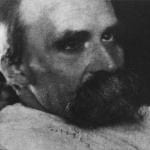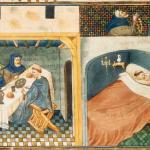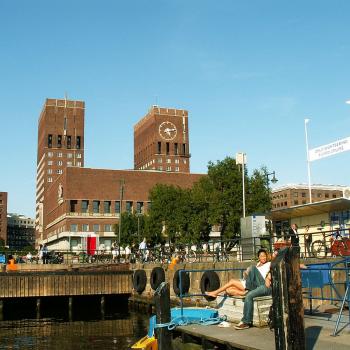If I may be forgiven one more long quote from Ludovici’s writings, his obituary for Oscar Levy, the first translator of Nietzsche into English is instructive. Ludovici was an anti-Semite; Levy was Jewish. Having to find some way around this conundrum, Ludovici had to make his old friend physically strong, that is, to his mind “not Jewish.” In doing so, he paints for us a picture of health, of a kind of aristocracy (that is, “virtue” in the sense of “virtus,” “manliness”) that betrays his wishes for a eugenicist future. At the same time, note his invocation of Levy’s generosity. Nietzsche too did not forbid such liberality to his Übermenschen. The selfish man need not be stingy; he merely needs to act from himself, devoid of guilt and pity:
His very gait, measured and dignified, proclaimed that he felt himself on parade during this consecrated hour, and he strongly deprecated the tearing, bustling and pointlessly hurrying antics of the crowds about him. It was as if he bore in his breast a crystal vessel full to the brim with the spirit of serenity, and to spill a drop was to him an act of sacrilege. His profession was medicine, but he was as unlike the popular idea of a doctor as can be imagined, and always assured me that, had it not been for his patients, he would have been the happiest of medical men. He was for a time Police Surgeon of the British Museum District of West Central London, but I gathered that the work was most distasteful to him.
When I first met him in the late summer of 1908, he struck me as being the most handsome Jew I had ever come across, and I soon found that his great popularity with women bore out his repeated contention that “women listen with their eyes”. Truth to tell, however, there was modesty in this implicit rationalization of his attractiveness to women, because as a conversationalist he was always extremely entertaining and often witty.
His features were exceptionally finely chiselled and free from any of that heaviness of lips, nose and eyelids which so often characterizes the Jew. The broad Schmisse running along his left cheekbone to his ear and temple revealed him as a man of Academic training, whilst his well-shaped hands, of which he was justly proud, were an indication of his good breeding. His manner was cordial and engaging. He knew what to say to put strangers of all sorts at their ease, and his wide erudition quickly corrected the impression many might at first receive that he was no more than a dandified wag. His Stammtisch at the old Vienna Café, opposite Mudie’s, was always well attended. Old habitués would come there day after day to enjoy his company, and it was usually at this table that new friendships were formed.
He had the appearance of opulence and, at the time of which I am speaking, he was in fact, as things then were, comfortably off. He could afford to be generous, and it was one of his most lovable traits, that he was generous to a fault. Even when he had lost most of his money in World War I, this characteristic remained, and often, at the cost of great personal sacrifice, he continued to make substantial presents to needy friends. No one who ever knew him could fail to testify to his deep humanity, and every struggling artist, poet or author of his acquaintance found an immediate response, if he ventured to make known his need. (“Dr. Oscar Levy”)
In sum, Ludovici embodied this strange pseudo-Nietzscheanism. He loved the pomp and circumstance, the manliness, the irreligiosity, and aristocratic verve. On the other hand, he introduced an odd racism, a kind of nationalist anti-Semitism that seems quite far from anything in Nietzsche. The point, however, is that there were many like him (Pound and D’Annunzio come to mind, among others). This was, for better or worse a tradition, one that it is odd to have seen (mostly) disappear. I have met a few people like this (mostly British, in fact), but you’d be hard pressed to find a well-known politician who speaks in these terms.
This confounds me. As I’ve explored before, I think Nietzsche has a point. I don’t agree with him that Christianity is always some mask for secret cruelty (though sometimes my pious brethren tempt me to his side). I do, however, hold to the idea that if there is no god, he is correct. We would need to reevaluate all values; there would be no room for mere flattering discussion of equality and justice. All would need to be made a question mark before some bright sunburst could flash upon the minds of our new human beings. Such people would, I suspect, if they wished to make any sense at all, have to be Nietzschean in character: bold, strong, creative, and sensual. Such people would be “of the Right” insofar as they would accept and even respect inequality; theirs would be a world of fitter and less fit people, “competition” taken to the point of aristocratic (in)difference. They might be generous here or help someone there, but it’s hard for me to see what reasons they could have for total self-sacrifice.
And that is the spirit of the Christian ideal: he’s right. Self-sacrifice in the name of love—that’s what Jesus Christ enacted, that’s what he taught us to carry forth. So much of our contemporary Left takes these values for granted, runs with them, wishes to bring justice and peace—but why? To what end? Absent God, I repeat: Nietzsche makes the most sense to me. Could we not do with more barebones honesty?
Yet, this world never did make much sense. The cross is, in its way absurd. That, however, seems more coherent to me than the world we baldly inhabit: a Left associated (almost essentially) with anti-religious views, the Right smeared—whether truly or with fingers crossed—with a fine paste of religious fervor, or, at least, justification.
Perhaps one day (and who am I kidding?) things will make sense again.













